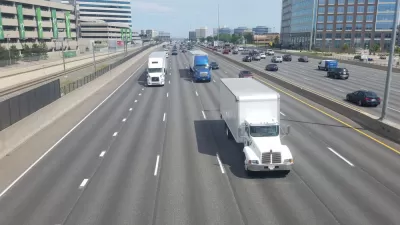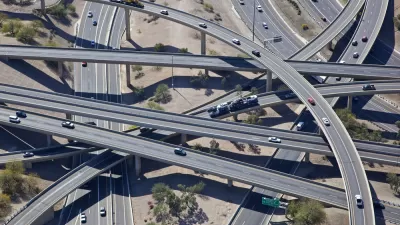The impending bankruptcy of the Highway Trust Fund a lack of clear purpose for national transport investment has Eric Jaffe asking if, after 120 years, we might be witnessing the end of federal transportation funding as we know it.
Jaffe lays out the two opposing arguments for what role the federal government should play in funding transportation.
"On one hand, there are those who believe the country would be better off if federal governance of transportation were either significantly reduced or entirely eliminated." In this scenario, transportation funding responsibility would be shifted to states and localities.
"Proponents of decentralization also point out that, like it or not, the process has already started," notes Jaffe. "This past fall, a number of cities passed referendums to fund local transportation, extending a trend that goes back several years."
On the other side, the arguments for continued federal investment are based on "the historical roots of national transportation investment and the need to coordinate interstate infrastructure."
"It's kind of a myth that it will be feasible for the federal government simply to shed responsibility and leave it to the states," says transport scholar Martin Wachs of the RAND Corporation, a California-based think tank. "There's a national interest in every aspect of the transportation system, and it's a political question as to how to organize it. It's a terrible mistake to think that the best thing to do is just to let it go."
"Of course there's a middle ground to this discussion." adds Jaffe. "The federal government can keep some sort of funding involvement in the nation's roads and rails but see its traditional top-down role of governance reformed."
In the current political climate the prospects for significant reform, whatever form it might take, are slim.
FULL STORY: The End of Federal Transportation Funding as We Know It

Alabama: Trump Terminates Settlements for Black Communities Harmed By Raw Sewage
Trump deemed the landmark civil rights agreement “illegal DEI and environmental justice policy.”

Study: Maui’s Plan to Convert Vacation Rentals to Long-Term Housing Could Cause Nearly $1 Billion Economic Loss
The plan would reduce visitor accommodation by 25% resulting in 1,900 jobs lost.

Planetizen Federal Action Tracker
A weekly monitor of how Trump’s orders and actions are impacting planners and planning in America.

Restoring Northern India’s Himalayan ‘Water Temples’
Thousands of centuries-old buildings protect the region’s natural springs and serve as community wells and gathering places.

Milwaukee to Double Bike Share Stations
Bublr Bikes, one of the nation’s most successful, will add 500 new e-bikes to its system.

DC Extends Application Window for Outdoor Dining Permits
District restaurants will have until the end of November to apply, but businesses with permits in rush hour parking lanes must end operations on July 31.
Urban Design for Planners 1: Software Tools
This six-course series explores essential urban design concepts using open source software and equips planners with the tools they need to participate fully in the urban design process.
Planning for Universal Design
Learn the tools for implementing Universal Design in planning regulations.
Caltrans
Smith Gee Studio
Institute for Housing and Urban Development Studies (IHS)
City of Grandview
Harvard GSD Executive Education
Toledo-Lucas County Plan Commissions
Salt Lake City
NYU Wagner Graduate School of Public Service





























